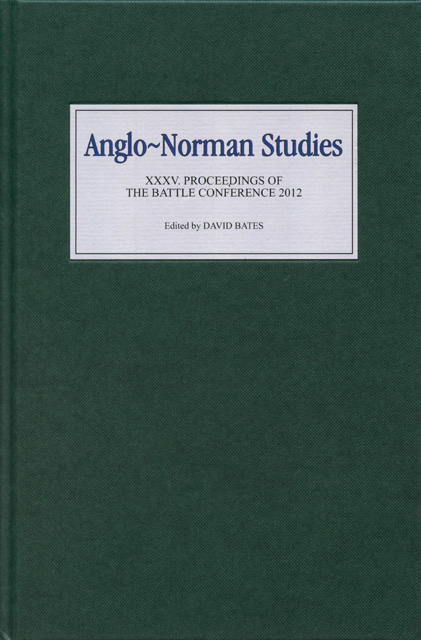Book contents
- Frontmatter
- Dedication
- Contents
- List of Illustrations and Tables
- Editor’s Preface
- Abbreviations
- A Three-Cornered Dynamic of Redemption in the ‘Long’ Thirteenth Century: Villein Manumissions and the Theology of the Incarnation (The R. Allen Brown Memorial Lecture, 2011)
- Femmes en religion, personnes d’autorité: les abbesses normandes (XIe–XIIIe siècles) (The R. Allen Brown Memorial Lecture, 2012)
- The Role of the Curator of the Bayeux Tapestry
- Early Normandy
- The Norman Conquest, Countess Adela, and Abbot Baudri
- Baldric of Bourgueil and the Flawed Hero
- John Bilson (1856–1943) and the Study of Anglo-Norman Romanesque
- The Identity of the Designer of the Bayeux Tapestry
- The Pseudo-Hugh Falcandus in His Own Texts
- The Thirteenth-Century Chronique de Normandie
- Les investitures abbatiales en Normandie: quelques réflexions autour du cas de l’abbaye du Bec-Hellouin (1034–1136)
- Robert Curthose: The Duke Who Lost His Trousers
- Sufficientia: A Horatian Topos and the Boundaries of the Self in Three Twelfth-Century Poems
- Aristocratic Acta in Normandy and England, c. 1150–c. 1250: The Charters and Letters of the Du Hommet Constables of Normandy
- Crime without Punishment: Medieval Scottish Law in Comparative Perspective
- Landscape and Belief in Anglo-Norman England
- Contents of Volumes 1–34
The Thirteenth-Century Chronique de Normandie
Published online by Cambridge University Press: 28 February 2023
- Frontmatter
- Dedication
- Contents
- List of Illustrations and Tables
- Editor’s Preface
- Abbreviations
- A Three-Cornered Dynamic of Redemption in the ‘Long’ Thirteenth Century: Villein Manumissions and the Theology of the Incarnation (The R. Allen Brown Memorial Lecture, 2011)
- Femmes en religion, personnes d’autorité: les abbesses normandes (XIe–XIIIe siècles) (The R. Allen Brown Memorial Lecture, 2012)
- The Role of the Curator of the Bayeux Tapestry
- Early Normandy
- The Norman Conquest, Countess Adela, and Abbot Baudri
- Baldric of Bourgueil and the Flawed Hero
- John Bilson (1856–1943) and the Study of Anglo-Norman Romanesque
- The Identity of the Designer of the Bayeux Tapestry
- The Pseudo-Hugh Falcandus in His Own Texts
- The Thirteenth-Century Chronique de Normandie
- Les investitures abbatiales en Normandie: quelques réflexions autour du cas de l’abbaye du Bec-Hellouin (1034–1136)
- Robert Curthose: The Duke Who Lost His Trousers
- Sufficientia: A Horatian Topos and the Boundaries of the Self in Three Twelfth-Century Poems
- Aristocratic Acta in Normandy and England, c. 1150–c. 1250: The Charters and Letters of the Du Hommet Constables of Normandy
- Crime without Punishment: Medieval Scottish Law in Comparative Perspective
- Landscape and Belief in Anglo-Norman England
- Contents of Volumes 1–34
Summary
On 2 July 1875 a meeting took place of the administrative committee of the Société de l’Histoire de Normandie, chaired by the famous historian, philologist, and librarian Léopold Delisle. In a wide-ranging opening address, Delisle began by thanking his listeners for their scholarly studies of Norman history at a time when, in the aftermath of the Franco-Prussian War, ‘the misfortunes of the fatherland have made the memories of an often glorious, ever-interesting past even dearer to us’. After a survey of the chief Latin narrative sources for the history of medieval Normandy prior to its annexation by the French monarchy in 1204, Delisle finally arrived at a neglected, thirteenth-century French prose composition generally known as the Chronique de Normandie. Lamenting that the death of Ernest Lépinois, founder of the Société, had left plans for a new edition of the Chronique in disarray, Delisle charged that:
One of you, Messieurs, must recommence this project. To bring it to a successful conclusion, it will be necessary to carefully compare the numerous manuscripts of the prose Chronique that have come down to us from the Middle Ages, and which present, between themselves, very great differences. Patient study will be required to return to the origins of this text, to classify interpolations, and to determine the dates of the various redactions. The collections of the Bibliothèque Nationale will provide ample resources for this research.
Despite this exhortation, however, Delisle (who died in 1910) was to remain disappointed in his hopes for a new edition of the Chronique de Normandie. The obvious hesitancy with which his audience evidently approached the text is understandable. Its rather imprecise title, granted by later printers, serves to cover a very broad range of vernacular histories of Normandy composed between around 1200 and 1350, all of which are unified by the reproduction in whole or in part of a translation of the Latin history of the Norman dukes most widely available to medieval audiences: the Gesta Normannorum Ducum (GND).
The first redaction of this work, produced by William of Jumièges in the years prior to 1070, revised and updated Dudo of Saint-Quentin’s earlier Latin chronicle of Norman history and was itself later modified and continued by Orderic Vitalis (c. 1109–13) and Robert of Torigni (c. 1139).
- Type
- Chapter
- Information
- Anglo-Norman Studies 35Proceedings of the Battle Conference 2012, pp. 163 - 180Publisher: Boydell & BrewerPrint publication year: 2013

